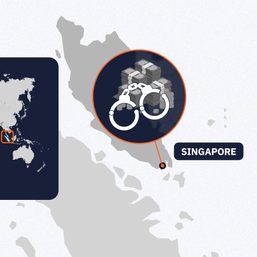SUMMARY
This is AI generated summarization, which may have errors. For context, always refer to the full article.

Australia’s Westpac bank has agreed to pay a record AU$1.3-billion (US$923-million) fine for more than 23 million breaches of money laundering laws, the bank and regulators announced on Thursday, September 24.
Australia’s financial intelligence watchdog, AUSTRAC, said the wrongdoing included Westpac failures to monitor international payments suspected of funding child exploitation.
“Our role is to harden the financial system against serious crime and terrorism financing and this penalty reflects the serious and systemic nature of Westpac’s non-compliance,” AUSTRAC chief executive Nicole Rose said in the statement.
Westpac acknowledged the breaches in a statement submitted on Thursday to a federal court, which must now approve the fine, the largest civil penalty in Australian history.
The penalty exceeded a provision of $900 million Westpac budgeted earlier this year to cover the expected penalty.
“I would like to apologize sincerely for the bank’s failings,” Peter King, Westpac’s chief executive, said in announcing the agreement.
King said Westpac had beefed up its financial crime monitoring capabilities and undertaken a “reassessment of our culture, governance, and accountability” to prevent future breaches.
“We are determined to continually lift our financial crime standards, comply with our obligations, and uphold our customer, community, and regulatory expectations,” he said in a statement.
The regulator accused Westpac in November 2019 of wholesale breaches of money laundering and counterterrorism regulations 23 million times, involving more than US$7 billion in funds.
Among the most damaging allegations against Westpac, the regulator accused bank executives of “indifference” to evidence that some international transfers were being used to fund child exploitation.
AUSTRAC said the bank had been aware of heightened risks associated with frequent small payments destined for Southeast Asia since 2013 and had been “specifically briefed” on the risks with respect to one of its money transfer channels in June 2016.
Westpac’s chief executive, Brian Hartzer, subsequently resigned over the scandal, handing over to King, the bank’s chief financial officer at the time.
The company chairman, Lindsay Maxsted, also stepped down.
Attorney General Christian Porter said the huge fine against Westpac “should serve as a wake-up call to all financial institutions” to comply with money laundering and counterterrorism regulations.
Home Affairs Minister Peter Dutton, whose department spearheads the battle against child abuse, drug trafficking, and terrorism, said Westpac had “breached the trust” of Australians.
“Banks have a responsibility to not let criminal activity go undetected and to protect Australians from serious and organized crime like child exploitation, drug trafficking, and fraud,” Dutton said.
Australia’s largest lender, the Commonwealth Bank (CBA), paid a fine of Aus$700 million in 2018 after AUSTRAC found it had failed to report on 53,500 transactions.
That had been the highest penalty ever imposed on an Australian company until Thursday’s agreement.
Australia’s banking industry, one of the world’s most profitable, has been under intense pressure in recent years for a wide range of wrongdoing.
The country’s 4 biggest banks – CBA, Westpac, National Australia Bank, (NAB), and ANZ – were the target of a royal commission that in 2019 exposed rampant malpractice across the sector.
It found banks had charged fees to dead people and to others for no services at all, used aggressive sales tactics, and provided poor advice that led to significant financial upheaval for clients.
All the banks have reported significant hits to profits as they reimburse hundreds of millions of dollars to wronged customers. – Rappler.com
Add a comment
How does this make you feel?





There are no comments yet. Add your comment to start the conversation.